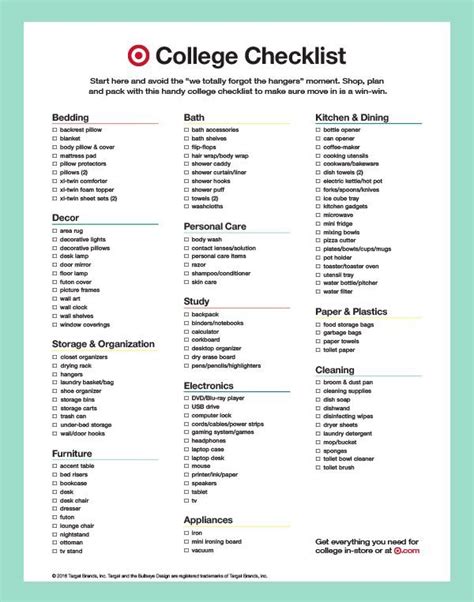As a college freshman, transitioning to the rigors of higher education requires a well-equipped study toolkit that can empower your academic journey. This comprehensive guide provides a detailed checklist of essential items to help you excel in your studies.

Technology Essentials
- Laptop or Tablet: A reliable laptop or tablet is crucial for note-taking, research, and accessing course materials online.
- Headphones: Noise-canceling headphones reduce distractions and enhance focus during study sessions.
- External Hard Drive: Backup your important documents, notes, and assignments to prevent data loss.
- Digital Note-Taking App: Evernote, OneNote, or Google Keep allow you to organize and search your notes digitally.
- Cloud Storage: Dropbox or Google Drive provides secure online storage for files, accessible from any device.
Stationery and Organization
- Notebooks and Pens: Choose high-quality notebooks for each subject and dedicate them specifically for lecture notes.
- Highlighters: Colorful highlighters help you identify important information in textbooks and materials.
- Binder or Folder: Keep your notes, handouts, and assignments organized by subject in a binder or folder.
- Planner: A physical or digital planner helps you track assignments, appointments, and deadlines.
- Sticky Notes: Jot down reminders, important concepts, or to-do lists on sticky notes to stay on track.
Study Aids
- Textbooks: Purchase or rent textbooks for all your courses, and annotate them with notes and highlights.
- Reference Books: Reference books, such as dictionaries, thesauruses, and subject-specific guides, provide quick access to essential information.
- Flashcards: Create flashcards for key concepts, terms, and formulas to facilitate memorization.
- Study Guides: Utilize study guides created by professors or other students to summarize main points and study effectively.
- Online Resources: Explore online platforms like Khan Academy, Coursera, and Udacity for supplemental learning materials.
Ergonomics and Time Management
- Comfortable Chair: Invest in an ergonomic chair that supports your posture and reduces fatigue during prolonged study sessions.
- Desk Lamp: Proper lighting is essential for reading and writing. Choose a desk lamp with adjustable brightness and direction.
- Pomodoro Timer: Use a Pomodoro timer to break down study sessions into intervals, alternating between focused work and short breaks.
- Schedule: Create a realistic study schedule that allows for consistent and dedicated time for studying.
- Breaks: Take regular breaks throughout your study sessions to refresh your mind and enhance focus.
Health and Well-being
- Water Bottle: Stay hydrated by keeping a water bottle within reach during study sessions.
- Healthy Snacks: Nourish your body with healthy snacks like fruits, nuts, or yogurt to maintain energy levels.
- Exercise: Regular exercise promotes mental alertness and reduces stress. Set aside time for physical activity each day.
- Sleep: Aim for 7-9 hours of quality sleep each night to optimize cognitive function and memory retention.
- Self-Care: Engage in activities that promote relaxation and well-being, such as reading, listening to music, or spending time in nature.
Tips for Successful Studying
- Active Recall: Regularly test your understanding by recalling information without looking at your notes.
- Spaced Repetition: Review material at increasing intervals to enhance long-term memory.
- Elaboration: Explain concepts in your own words to deepen your comprehension.
- Interleaving: Mix up different subjects during study sessions to improve retention.
- Seek Help: Don’t hesitate to ask for assistance from professors, teaching assistants, or classmates when needed.
Additional Considerations
- Personalized: Customize your toolkit to meet your specific study habits, preferences, and needs.
- Budget: Consider your budget and prioritize essential items while exploring affordable options.
- Technology Compatibility: Ensure that your technology devices are compatible with campus systems and required software.
- Accessibility: Access to resources and accommodations for disabilities is paramount. Contact the disability services office if needed.
- Sustainability: Choose sustainable products, such as recycled paper or reusable pens, to reduce environmental impact.
By adhering to this comprehensive checklist, college freshmen can equip themselves with the tools and strategies necessary to excel in their academic endeavors. Remember, academic success is a journey that requires consistent effort, effective study habits, and a positive mindset.
